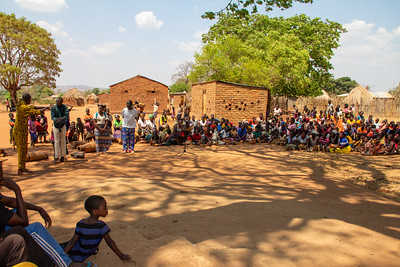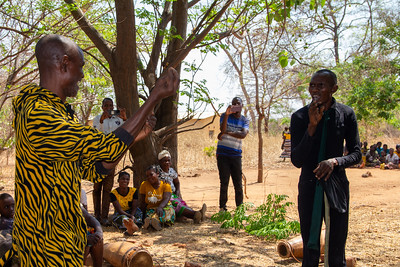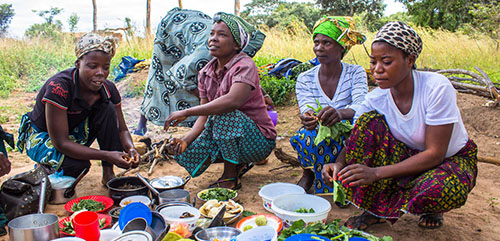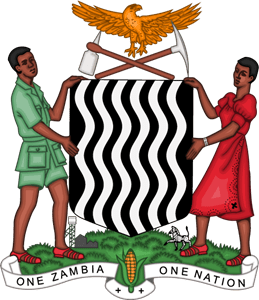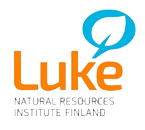ZAMBIA FOR AGROFORESTRY, BIODIVERSITY AND CLIMATE (Z4ABC)
Z4ABC is working towards transformation of agricultural, forestry and wildlife-based value-chains to become more sustainable, climate-resilient and productive, while at the same time improving local livelihoods, food security, and biodiversity.
Description
The Zambia for Agroforestry, Biodiversity and Climate Action – (Z4ABC) project is funded by the European Commission’s DeSIRA initiative, with co-funding from Finnish partners and the Centre for International Forestry Research (CIFOR). Partners include three Finnish research and higher education institutions, namely the Natural Resource Institute Finland (Luke), the Viikki Tropical Resources Institute (VITRI) at the University of Helsinki and Häme University of Applied Sciences (HAMK). Together they will provide expertise in facilitation, capacity building support, data collection and data analysis, as well as support to identify and implement relevant pilot actions. The project is collaborating closely with different governmental, non-governmental and private sector partners at national, landscape, and local levels, as well as with different actors involved in the selected nature-based value chains. The focus beneficiaries are the local communities.
Contact us
FACT
Objectives
Overall objective
- The overall objective of the action is to contribute to the development of climate-relevant, productive, and sustainable transformation of agriculture, forestry, and food systems in Zambia to help achieve the Nationally Determined Contributions (NDC).
Specific objectives
- To improve livelihoods and climate change resilience of specific agricultural, agroforestry, forestry, and food systems in the Lower Zambezi–Luangwa–Nyika corridor
- To increase the climate relevance of Agriculture and Knowledge Innovation Systems (AKIS) in the Lower Zambezi–Luangwa–Nyika corridor.
Key activities
- Co-identification and co-development of nature-based value chains with local communities and VC actors (supported by multi-actor platforms).
- Grants and other up-scaling activities for sustainable VC innovations and practices.
- Business incubation and marketing activities, including linking the private sector and the local producers, and matching the quality of the products with the markets.
- Co-learning, capacity building, training, and awareness raising at different levels (e.g., Agricultural Knowledge & Innovation Systems).
- Participatory land-use scenario modelling workshops and policy dialogue.
- Multidisciplinary pre- and post-pilot data collection to measure the performance and impact of the VC interventions.
The project Theory of Change presented in Figure 1 illustrates how the work falling under each of the project’s four main Outputs are expected to work together to contribute to DeSIRA’s objectives.

Project locations
The Z4ABC action will be implemented in the Lower Zambezi – Luangwa – Nyika (ZLN) corridor in Zambia. The target Provinces include Lusaka Province, Eastern Province, and Muchinga Province.
Preliminary Landscape 1: Lusaka Province – Rufunsa and Luangwa Districts
The landscapes in Lusaka Province are relatively close to major markets in the capital city of Lusaka. The Lower Zambezi National Park is located in the province. The park is home to diverse wildlife biodiversity, which is under threat due to poaching, and the plans to introduce mining near the national wildlife park. Agriculture is the mainstay of thousands of farmers. Climate change has negatively impacted food security due to frequent droughts in the past decade. Introducing agroforestry and other climate-smart agriculture practices, holistic landscape management, and sustainable management of forests, and forest products (e.g. NTFPs), has the potential to contribute to increased food production, biodiversity, and livelihood resilience for smallholder-farmers. The two potential target districts in Lusaka Province include Luangwa and Rufunsa. They are selected as the Lower Zambezi National Park – an important part of the ZLN-corridor – is partly located in these districts. They are also relatively close to Lusaka, which is an important market hub, with much of the nature-based VCs being marketed in or transiting through the capital. The potential VCs supported in this area includes both forest-based and agricultural VCs.
Preliminary Landscape 2
1. Eastern Province
Eastern Province has a range of potential opportunities identified for the development of value chains in agriculture, forestry, and wildlife-based enterprises. The region has a high concentration of poor communities; mainly smallholder farmers affected by climate change and the expensive cost of farm inputs. The North and South Luangwa National Parks and buffer zones are in the province, with several game management areas (GMAs) buffering wildlife parks and intensive smallholder farms. Additionally, there are many potential partners and previous and current relevant projects to build in the area. The landscape is relatively close to the city of Chipata which offers a vast market for products coming from the improved value chains.
- Nyimba District (Eastern Province): Nyimba District (target area located in Agroecological Zone I) has relatively low agricultural potential, short growing season, and high drought risk. It has high potential for the development of forest-based VCs (and partly wildlife-based VCs), such as NTFPs (e.g. native fruits, honey, bee wax products, medicinal plants etc.). It has also abundant wild bamboo forests with high potential for bamboo products.
- Katete District (Eastern Province): Katete District (located in Agroecological Zone IIa) has high potential for agroforestry and agroecological practices, as it has a relatively high rain fall, medium- to high risk of drought, and the land is suitable for agricultural production. Hence, this site is selected particularly to develop VCs in the integrated systems using agroforestry and other agroecological approaches. It is also an area that has a low forest cover (due to past deforestation) with potential for increasing the tree cover in the landscape.
Muchinga Province (Mpika and/or Lavushi Manda District) (located in Agroecological Zones I, IIa or III): There are several national parks and game reserves in Muchinga Province, with high forest cover, unique wetlands, and abundant wildlife. Conserving the remaining forest and wildlife is crucial in terms of biodiversity conservation and climate change mitigation targets of Zambia. Target VCs in this area are the forest-and wildlife-based VCs (e.g. mushrooms, wild fruits, honey and bee wax products, mopane worm, chikanda, handicrafts, game meat and its by-products), as well as community-based game management and ecotourism activities.
Selected target areas and landscapes
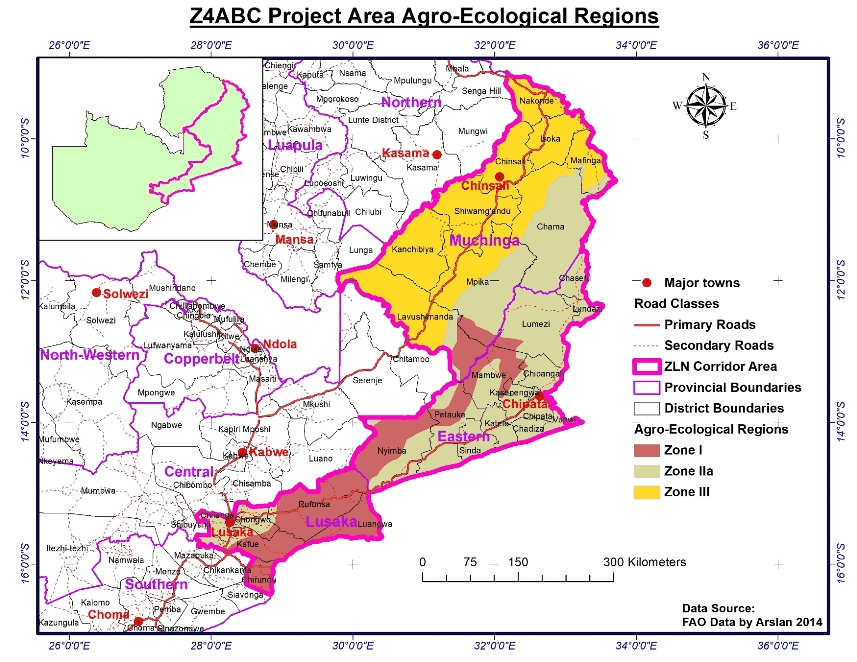
News
Publications
Project team
Photo gallery
View more at the Flickr album
